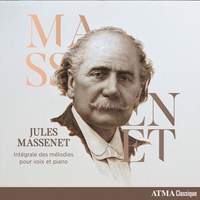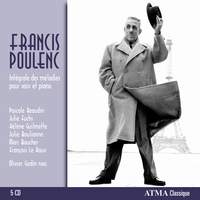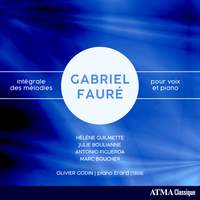Interview,
ATMA Classique's complete Massenet songs project
 Last month I had the very great pleasure of spending a few days in Montreal as a guest of our friends at ATMA Classique, getting to know the city's classical music scene a little better, attending a recording-session with Arion Baroque at the beautiful Église St-Augustin in Mirabel, and consuming industrial quantities of poutine at every opportunity...The main event, though, was the launch-concert for the Canadian record-label's most ambitious and extensive project to date: a boxed set of the complete mélodies of Massenet, featuring some of Canada's finest singers and including a significant number of world premiere recordings.
Last month I had the very great pleasure of spending a few days in Montreal as a guest of our friends at ATMA Classique, getting to know the city's classical music scene a little better, attending a recording-session with Arion Baroque at the beautiful Église St-Augustin in Mirabel, and consuming industrial quantities of poutine at every opportunity...The main event, though, was the launch-concert for the Canadian record-label's most ambitious and extensive project to date: a boxed set of the complete mélodies of Massenet, featuring some of Canada's finest singers and including a significant number of world premiere recordings.
Following the recital at the Chapelle historique du Bon-Pasteur (featuring performances from Karina Gauvin, Marc Boucher and rising German-Canadian soprano Anna-Sophie Neher), I sat down with ATMA's general and artistic director Michel Ferland to find out more about how the project took shape, why Massenet's songs have never quite received the same attention as those by Fauré, Ravel or Debussy, and the large body of songs which he wrote in celebration of Christmas...
This is one of the most extensive projects ever undertaken by a Canadian record-label - who was the driving-force behind it, and what were the initial challenges involved?
The idea came from Marc Boucher from Festival Classica, with whom we’d previously worked on the Fauré and Poulenc mélodies. It felt a bit crazy at the beginning, because it seemed like an impossibly big project…and it only got bigger as things progressed, because Marc spent nearly two years working with Massenet scholar Jacques Hétu to track down the unpublished mélodies. We started out with about 285 and ended up with 333, and Marc’s convinced that there are still others out there somewhere! They’ve been all over France talking to friends of Massenet and singers and musicians who just happened to have copies of things that weren’t in any archives, and we wouldn’t be surprised if another ten or fifteen songs materialise in the next five years…maybe we’ll do an appendix!
Apart from ‘Nuits d’Espagne’ and a handful of others, we don’t get to hear these songs all that much in recital in UK – is it a different story in Francophone countries?

There are maybe ten or fifteen songs which get programmed fairly regularly here, but I’m sure that this new box will inspire some singers to do more. So many of Massenet’s songs are very original, and he sets a lot of unknown poets, many of them women. In the digital booklet we have an essay by Catherine Scholler discussing Massenet’s fascination with writing by women: if you think about Thaïs, Manon, Cendrillon, so many of his operas centre around femininity and eroticism, and Jacques Hétu told me he was very impressed by women’s facility to seduce, to be a bit more than human…And you can see that in the choice of his poems in the mélodies – it’s clearly something that is an integral part of him.
How much do we know about his own relationships with women?
Not much at all! He seems to have had a difficult relationship with his wife, and there were various lovers, but that was all kept secret…several scholars have drawn some parallels between his writing and his personal life, and there are a few clues in the liner-notes! We do know that towards the end of his life he had an affair with Lucy Arbell, who was a wonderful contralto – one of his last cycles, Expressions lyriques, is dedicated to her, and it’s sung by Marie-Nicole Lemieux here. (It exists in two versions – one with quite a lot of spoken text and one with slightly less - and we include both in the boxed set). That cycle is such a wonderful discovery: I think every mezzo should programme it in recital!
Can I push you to pick out two or three favourites in terms of individual songs?
Karina Gauvin sings a mélodie called ‘Vieilles lettres’, which is just lovely. And Marie-Nicole does an incredibly touching song entitled ‘Chant de nourrice’, where there’s a narrator (Jean Machand) commenting on the singing with spoken text; the melody is very fine and delicate, and Marie-Nicole has such a round, velvety voice that it really conveys the idea of the nurse taking care of the baby.
One other stand-out for me was not a song, but a singer - the young baritone Hugo Laporte. He’s only been in the business for four or five years, but he’s like an old soul in a young body: the voice is very deep and rich, and he’s so sensitive to text. Another great new voice is Anna-Sophie Neher, who to me is already a world-class soprano – Traviata is not far off!
Who selected and nurtured the singers for the project? Does Massenet's writing present any particular challenges which required specialist coaching?
Marc was responsible for casting the singers, and also asking Olivier Godin to play for all the songs with piano! At first we thought about splitting it between three or four pianists, but eventually we decided that for the integrity of the project it would be better to have the same one for the whole set - and we’d have such a good experience working with Olivier on the Fauré and Poulenc that it just made sense. Marc’s one condition was that he wanted to have a historical piano, and they found this beautiful 1854 Erard in France – it cost something like 100 000 dollars just to get it fixed up and moved from France to Montreal, but it was worth it!
Marc was also present at every session to supervise pronunciation and style, and make sure that everyone had the same kind of approach to the text. You really have to know how to work with the spoken word for a lot of these songs, and there’s a very particular way to do that in French: the challenge is to make sure the pronunciation remains crystal-clear even when the emotional temperature rises, and listening back I’m so glad we invested so much time in getting that right! The whole process involved 65 days of recording-sessions, with each one lasting five or six hours.
Were you involved in the sessions yourself?
That was all supervised by Johanne Goyette, and I came in at the post-production stage to sit down with Johanne and decide the order of the mélodies and how to split them across CDs. It’s interesting when you have a complete collection like this, because it’s like a history: we’ve essentially presented them in chronological order, maybe not by year exactly but grouping the songs together by decade, from the 1860s until his death in 1912.
How much does his musical language evolve over those fifty years?
It’s a bit closer to musique de salon at the beginning and then edges towards Fauré territory, and even towards Debussy in terms of some of the harmonies…he’s obviously listening to what is going on all around him. Here and there you can spot some influences from the operas, and that’s nice for listeners because they’re so famous compared with the mélodies - for instance, there’s a reference to Charlotte’s letter-scene in Werther in one of the songs which Marie-Nicole Lemieux sings.
That scene is of course set on Christmas Eve, which reminds me...Massenet wrote a lot of Christmas songs, so CD 5 is devoted to them, regardless of whether they’re early or late. There’s one song ‘Venez, divin Messie’ (sung here by Karina Gauvin), which is based on a very well-known canticle in Quebec, but he sets new words and makes it into something very original. He also composed two mélodies on English poems, which we recorded in English – a teaser for the English listener!
Do you have any theories as to why the bulk of Massenet's songs have never really gained the same foothold in the repertoire as those by other French composers of that generation?
We really don’t know! Maybe it was considered too musique de salon – Fauré, Poulenc, Debussy are all seen as more ‘original’ than Massenet, who was very connected to the time he was composing. He was essentially a Romantic composer who was attracted to slightly old-fashioned poems – texts which can feel quite dated today in terms of their approaches to sexuality and eroticism or the sacred.
As well as being a fine baritone, Marc Boucher is clearly a much-loved figure on the Montreal music scene - how did the two of you meet, and do you have plans to continue working together?
I’ve known him since we were students: we were in the same class at the University of Montréal, nearly forty years ago! Marc founded the Festival Classica ten years ago, and before that he was a full-time singer – that guy sang with everybody! French repertoire was always his passion, and he was a very good Pelléas at the beginning of his career: I saw him do it at the Opéra de Montréal in the 1990s, and he also got a lot of recognition in France. He started his recording career with a friend’s label about twenty years ago but then he approached ATMA for that Poulenc cycle, which was a nice start to our professional relationship!
Marc’s keen to keep working with ATMA, and we have another exciting project with his Festival coming up next year: he’s producing three one-act operas which we’ll essentially record live. He’s full of ideas and the festival is very popular – he’s always mixing popular and classical themes, so he does programs ranging from The Beatles to Beethoven, or Pink Floyd to Berlioz! He puts on everything from open-air concerts with thousands of people to more intimate recitals in churches in theSt-Lambert area: St-Lambert is a small city about ten minutes by car from Montreal, but there are a lot of people living there on the south shore and we like to take music out to them.
It’s all about reaching new audiences: when you mix in popular things you attract some people who otherwise wouldn’t come to a classical concert, and they discover that they like it! Every year the Festival gets bigger and bigger; there are plans to convert a church to a concert-hall, and to expand the program from a month of activities to concerts throughout the whole year.
This is such a beautifully-presented set, and Danny Ferland's portraits of the artists in the booklet are incredibly striking - how did you find the right person for the job?

We try to have original paintings for our projects wherever possible. When Guillaume Lombart acquired the ATMA label in 2020 he wanted to give the opportunity to painters to illustrate covers of our albums, and when we started working on the Massenet project he was keen to have portraits of every single artist. Our Art Director Denise Lefebvre (who’s a painter herself) is very well connected with a lot of artists in Montreal, and she suggested Danny: he has a very original approach to portraits, with a specific structure that alters the features just a little to capture the deep essence of the subject.
Danny loves music and musicians: he listened to some of the recordings for inspiration as he worked, and now that he has the boxed set he's continued to explore the songs and read the liner-notes. And his work has obviously spoken to people: his portrait of Julie Boulianne got 4000 likes on Instagram almost overnight!
Jules Massenet - Intégrale des mélodies pour voix et piano
Jules Massenet: Intégrale des mélodies pour voix et piano
Artists include Olivier Godin (piano/harmonium/harpsichord), Karina Gauvin & Anna-Sophie Neher (sopranos), Julie Boulianne & Michèle Losier (mezzos), Marie-Nicole Lemieux (contralto), Antonio Figueroa (tenor), Marc Boucher & Hugo Laporte (baritones)
(Please note that the booklet contains no translations of sung texts).
Available Formats: 13 CDs, MP3, FLAC, Hi-Res FLAC
Olivier Godin (piano), Julie Fuchs, Pascale Beaudin, Helene Guilmette (sopranos), Julie Boulianne (mezzo), Marc Boucher, Francois le Roux (baritones)
Available Formats: MP3, FLAC, Hi-Res FLAC
Olivier Godin (piano), Hélène Guilmette (soprano), Julie Boulianne (mezzo), Antonio Figueroa (tenor), Marc Boucher (baritone)
Available Formats: 4 CDs, MP3, FLAC, Hi-Res FLAC





